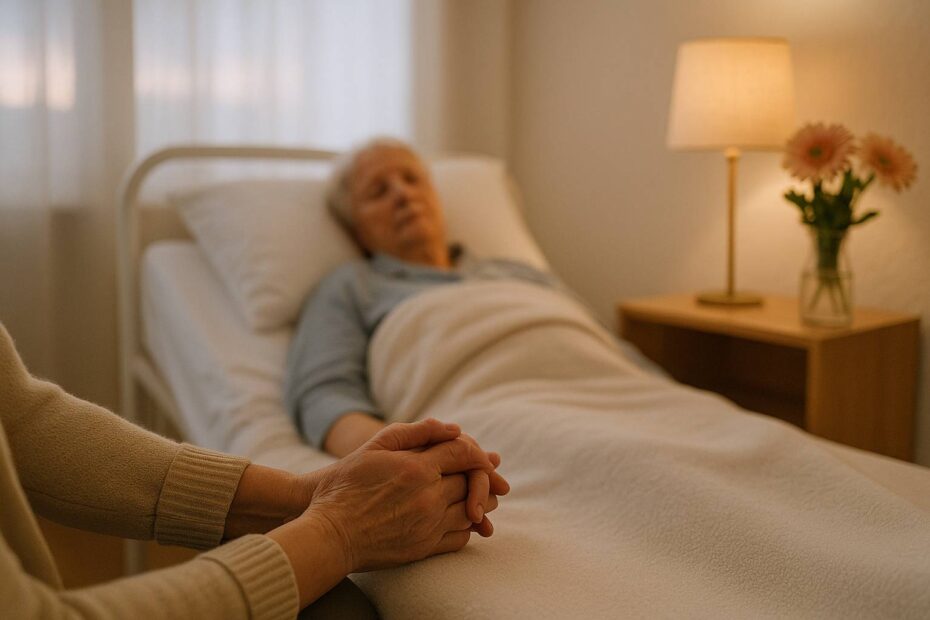When a loved one stops eating near the end of life, it’s heartbreaking and confusing. You find yourself wondering, How long can they live like this? As a certified geriatric care manager and someone who has walked this journey with many families, I want to help you understand what’s happening — and reassure you that this phase, though painful, is a natural part of the body’s process of shutting down.
In this article, I’ll gently guide you through why patients stop eating, and what to expect physically and emotionally, and how you can provide comfort during this time. It’s not about prolonging suffering; it’s about ensuring dignity, peace, and love during one of life’s most sacred transitions.
Let’s walk through it together.
Why Do Hospice Patients Stop Eating?
When someone you love stops eating, it’s easy to feel like something’s gone terribly wrong. But I want you to hear me clearly: this is a normal part of the dying process. It’s not something you’re causing, and it’s not something you can fix. Their body is doing exactly what it needs to do.
As a person nears the end of life, their body quietly begins to slow down. Here’s why eating fades away:
- The body doesn’t need much fuel anymore. Metabolism drops, and the energy demands are so low that hunger simply disappears. Imagine a fire burning low — it doesn’t need much wood to keep flickering.
- Eating becomes harder. Swallowing can feel like a chore. Dry mouth, weakness, and even changes in the brain make food less appealing — and sometimes even uncomfortable.
- They’re just too tired. Picture how much effort it takes to sit up, chew, swallow. For someone at this stage, even small movements sap precious energy. Sleep feels far better than a meal.
- Sometimes, it’s emotional too. Some people seem to know, deep down, that it’s time. They aren’t scared or stubborn — they’re ready. Refusing food can be part of letting go with grace.
I know it’s hard to watch. Every instinct you have tells you to nourish them, to fight for them. But sometimes the greatest love you can show is to simply be there, without trying to force what the body no longer needs.
You are doing enough.
You are enough.
How Long Can a Hospice Patient Live Without Food or Water?
This is one of the most painful questions families ask — and I understand why. You want to prepare yourself. You want to know what to expect. You want to brace your heart.
The honest answer is: it depends.
Every person’s body is different, but here’s a general idea based on what I’ve seen and what hospice care teams often share:
- Without food: Many patients can live for weeks without eating much — sometimes even a month or more — especially if they are still drinking small amounts of fluids.
- Without water: Once a person stops drinking completely, life typically lasts just a few days to about a week. The body cannot go very long without hydration.
But please hear this:
The absence of eating or drinking at this stage isn’t what causes death. It’s the underlying illness that is leading the body through its natural final steps. The loss of appetite and thirst is a symptom, not the cause.
Trying to force food or fluids at this point can sometimes cause more discomfort — choking, nausea, bloating.
Gentleness is key. Small sips if they want it. Moistening their lips and mouth if they don’t. Comfort over calories.
When you feel helpless, remember: your presence is the real nourishment now. Holding their hand, whispering memories, sitting quietly nearby — that’s the true care they need.
What Are the Signs That Death Is Near When a Person Stops Eating?
When a loved one stops eating and drinking, it’s often a sign that their journey is nearing its end.
It’s not sudden — the body tends to give us little signals along the way. Knowing what to look for can help you prepare your heart and create a space of peace around them.
Here are some of the signs I often see:
- Increased sleep and unresponsiveness: They’ll spend more time asleep, and even when awake, they may seem distant or confused. Think of it as the body gently pulling away from the world.
- Cool hands and feet: Circulation slows down as the body focuses on vital organs. You might notice their skin feeling cooler, or their fingertips and toes looking a little bluish.
- Changes in breathing: Breaths may become irregular — sometimes rapid, sometimes with long pauses. It can sound different or even noisy. I know it can be frightening to hear, but often, the person isn’t in distress even if their breathing sounds unusual.
- Lower blood pressure and weaker pulse: Nurses may monitor this, but you’ll also notice it in small ways — softer skin color, weaker touch.
- Eyes and facial expressions change: Their gaze might become unfocused. Their face may relax more deeply. Some say the eyes look like they’re “looking past you” — and in a way, they are.
Remember, not everyone shows every sign. Some people pass quietly with only a few gentle changes, while others have more noticeable shifts.
This is the time to focus on comfort, presence, and love — not medical interventions.
Their body is wise. It knows the way.
And you are doing exactly what they need most: being there.
Should You Try to Feed a Hospice Patient Who Isn’t Eating?
This is one of the hardest crossroads for families — and I want to walk it with you gently.
When someone you love stops eating, every instinct you have says, “Maybe just one more spoonful. Maybe it will help.”
But in hospice care, forcing food can actually cause more harm than good.
Here’s why:
- Their body can’t process food the way it used to. Even if you get them to swallow, the digestive system has slowed down so much that food can cause bloating, nausea, or even pain.
- It can lead to choking or aspiration. Weakened muscles can make swallowing unsafe. Pushing food or drink could accidentally send it into the lungs, causing pneumonia or distress.
- Eating might not bring comfort anymore. At this stage, food isn’t pleasure or fuel. It’s just another demand on a tired body that’s trying to focus on the essential act of letting go.
So what can you do instead?
- Offer tiny sips of water if they want it.
- Moisten their lips and mouth with a soft sponge or cloth.
- Apply lip balm to prevent dryness.
- Sit with them. Talk to them. Hold their hand.
Comfort, not calories. Presence, not pressure.
That’s the kind of “feeding” that matters now — feeding the spirit with love, not the body with food.
And trust me:
Your love is enough.
How You Can Comfort Someone Who Has Stopped Eating
When you can no longer offer food to nourish their body, you shift into something even more powerful — nourishing their spirit.
Here are some simple but deeply meaningful ways to bring comfort when your loved one has stopped eating:
- Keep their mouth moist. Use a soft sponge swab dipped in water to gently moisten their lips, gums, and tongue. It eases dryness and brings surprising comfort.
- Play their favorite music softly. Music has a way of reaching places words can’t. Even if they seem unresponsive, they can often still hear you — and a favorite song can be like a hug for the soul.
- Touch and presence. A gentle hand on theirs. Stroking their forehead. Sitting quietly nearby. You don’t have to fill the silence — your presence is what they feel most deeply now.
- Speak from the heart. Tell them what they mean to you. Share memories. Say things you’ve always wanted to say. Even if they can’t respond, hearing your voice can bring enormous peace.
- Create a calming environment. Dim the lights. Lower the noise. Light a familiar scented candle if it’s allowed and safe. This is about making their world feel soft and safe.
Above all else: follow their lead.
If they want your voice, speak.
If they want your silence, stay quietly close.
The dying process isn’t about doing — it’s about being.
And your loving “being there” is the greatest gift you could ever give.
Final Thoughts: Letting Go with Love
Watching someone you love stop eating is one of the most tender — and most painful — moments you’ll ever face.
It’s natural to want to hold on. It’s natural to want to fix it. But sometimes, the bravest, kindest thing you can do is to let go with love.
Trust that their body knows what it’s doing.
Trust that your presence matters more than anything you could put on a spoon.
Trust that the bond you share — the laughter, the memories, the love — carries on, even after the body is ready to rest.
This journey isn’t about forcing more days.
It’s about filling the days that are left with peace, dignity, and grace.
Hold their hand. Whisper your love. Sit by their side.
And when the time comes, know this:
They will carry your love with them. Always.
You are not alone in this.
And you are doing beautifully.








